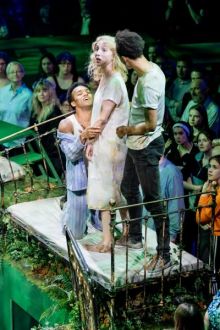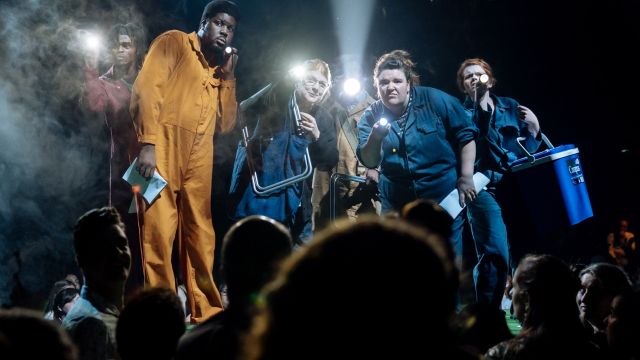A Midsummer Night’s Dream
Here is a boisterous, fast, romantic, ad-libbing, slapstick-funny production of Shakespeare’s malleable play. Like all great comedies, there is more to it than comedy. Director Nicholas Hytner freely admits the ‘influence’ of Peter Brook’s famous production of the Dream he saw in 1970, and the much more recent A Handmaid’s Tale - the first in irreverent style, the second in sexual politics - and reflected in Christina Cunningham’s austere costumes. Mr Hytner strips out the seats from the very adaptable Bridge Theatre pit, so that much of the audience surrounds and moves around raised platforms on which the action takes place. The forest fairies - Puck (David Moorst), Peaseblossom (Chipo Kureya), Cobweb (Jay Webb), Moth (Charlotte Atkinson), Mustardseed (Lennin Nelson-McClure) and Bedbug (Rachel Tolzman) - are glamorous, sexy, singing acrobats who descend on swings or hover above.
 Shakespeare opposes the patriarchal city against the freedom and anarchy of Nature - or a dream - in the forest. A similar opposition to As You Like It, but here pushed much, much further. Before the fun begins (and the accent is very much on fun - but without abandoning the central idea) the opening scene, where Egeus (Kevin McMonagle) demands his rebellious daughter Hermia (Isis Hainsworth) marry Demetrius (Paul Adeyefa) although she is in love with Lysander (Kit Young, who speaks the verse exquisitely). The alternative is that she be killed. That’s the harsh regime here, in which women are the property of fathers and husbands to be disposed of as ordered. The Duke, Theseus (Oliver Chris) naturally agrees with the irate father. After all, Theseus’ queen, Hippolyta (Gwendoline Christie, the fearsome woman warrior from Game of Thrones) is encased in a glass box, seen but not heard. What ensues in the forest - and after - will turn all that on its head.
Shakespeare opposes the patriarchal city against the freedom and anarchy of Nature - or a dream - in the forest. A similar opposition to As You Like It, but here pushed much, much further. Before the fun begins (and the accent is very much on fun - but without abandoning the central idea) the opening scene, where Egeus (Kevin McMonagle) demands his rebellious daughter Hermia (Isis Hainsworth) marry Demetrius (Paul Adeyefa) although she is in love with Lysander (Kit Young, who speaks the verse exquisitely). The alternative is that she be killed. That’s the harsh regime here, in which women are the property of fathers and husbands to be disposed of as ordered. The Duke, Theseus (Oliver Chris) naturally agrees with the irate father. After all, Theseus’ queen, Hippolyta (Gwendoline Christie, the fearsome woman warrior from Game of Thrones) is encased in a glass box, seen but not heard. What ensues in the forest - and after - will turn all that on its head.
Theseus, the mortal ruler, is paralleled by Oberon, the fairy king. Here, both are played by Mr Chris, and his transition from stern, icy ruler to befuddled lover smitten by an ass is beautifully done and quite delightful. Yes, it is Oberon who falls madly in love with Bottom (Hammed Animashaun), pushing the production’s gender-bending freedom of the forest further. Mr Hytner switches some dialogue, giving Oberon’s lines to Titania (yes, Gwendoline Christie too) and vice-versa. This change is very much on message: the patriarchy reversed - momentarily anyway...
Mr Animashaun’s Bottom comes very close to stealing the whole show. As the cheerfully overbearing self-appointed leader of the rude mechanicals theatre troupe, he’s full of bad ideas, overriding poor Quince (Felicity Montagu). His ad-lib interactions with the audience are fast and unconstrained. In one sequence, the mechanicals are lost in the forest. Bottom appeals to the audience for a phone with Google maps. Of course, someone obliges - only to be embarrassed when the mechanicals purport to find some spicy stuff on the phone.
 Each of the rude mechanicals - besides Bottom and Quince, Flute (Jermaine Freeman), Snout (Ami Metcalf) Snug (Jamie Rose-Monk) and Starveling (Francis Lovehall) - has a distinctive character and their rehearsals and eventual performance are given due comic weight, not at all the embarrassing afterthought they can be in some productions. Shakespeare ‘humour’ can sometimes so easily fall flat or go over our heads: not in this show. The mechanicals are laugh-out-loud and the audience loves them. As for the mixed-up lovers, the feuding girls, Hermia and Helena (Tessa Bonham Jones), whose bickering and worse can be irritating, here win our hearts. Ms Hainsworth’s Hermia is simply adorable (‘she is small but she is fierce’) and Ms Bonham Jones’ Helena is very angry and very definite and hilariously conveys not very bright as well. In other words, here too, the maximum comedy is extracted from the text. Indeed, with so much comedy, so much emphasis on comedy, the ‘poetry’, so to speak, can sometimes suffer. Ms Christie’s Titania gets stuck with a lot of it and unfortunately it falls rather flat. There is almost the feeling that she alone might be miscast - although her casting fits the ‘concept’ perfectly.
Each of the rude mechanicals - besides Bottom and Quince, Flute (Jermaine Freeman), Snout (Ami Metcalf) Snug (Jamie Rose-Monk) and Starveling (Francis Lovehall) - has a distinctive character and their rehearsals and eventual performance are given due comic weight, not at all the embarrassing afterthought they can be in some productions. Shakespeare ‘humour’ can sometimes so easily fall flat or go over our heads: not in this show. The mechanicals are laugh-out-loud and the audience loves them. As for the mixed-up lovers, the feuding girls, Hermia and Helena (Tessa Bonham Jones), whose bickering and worse can be irritating, here win our hearts. Ms Hainsworth’s Hermia is simply adorable (‘she is small but she is fierce’) and Ms Bonham Jones’ Helena is very angry and very definite and hilariously conveys not very bright as well. In other words, here too, the maximum comedy is extracted from the text. Indeed, with so much comedy, so much emphasis on comedy, the ‘poetry’, so to speak, can sometimes suffer. Ms Christie’s Titania gets stuck with a lot of it and unfortunately it falls rather flat. There is almost the feeling that she alone might be miscast - although her casting fits the ‘concept’ perfectly.
One might question other elements, such whether the audience up close and visible around the platforms works as well as it did in Mr Hytner’s Julius Caesar, where the audience willynilly became the citizens of Rome. Here, they’re just the audience, and sometimes distracting. Although the NTL cameras catch all the subtlety of the acting - particularly of, say, Mr Chris, or Mr Moorst’s irrepressible Puck - there’s also the sense, with this NTL show, that it definitely would’ve been better to be there than to watch from the outside. That said, the production’s energy and confident comedy more than compensate for any misgivings.
Michael Brindley
Photography: Manuel Harlan.
Subscribe to our E-Newsletter, buy our latest print edition or find a Performing Arts book at Book Nook.

